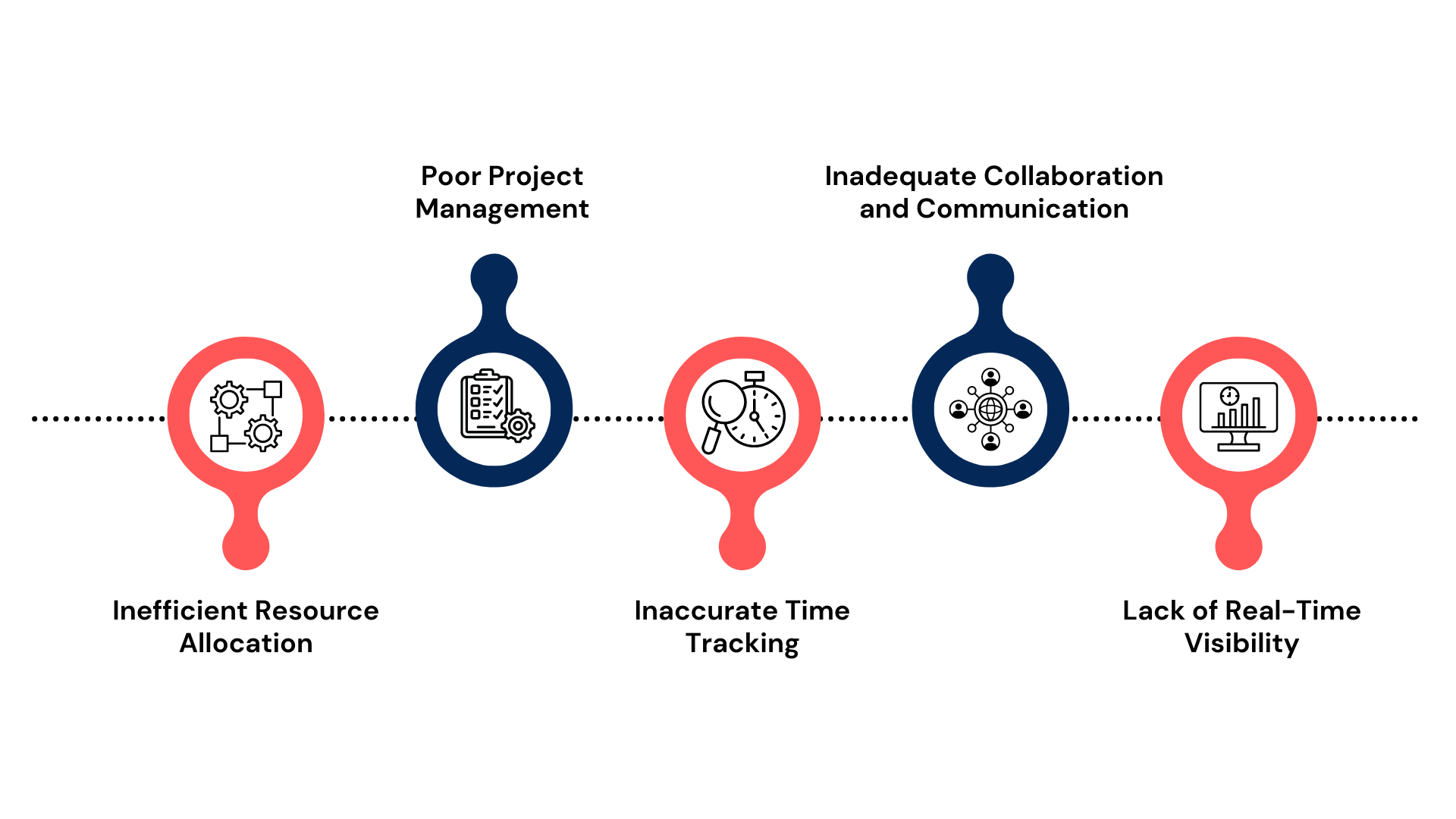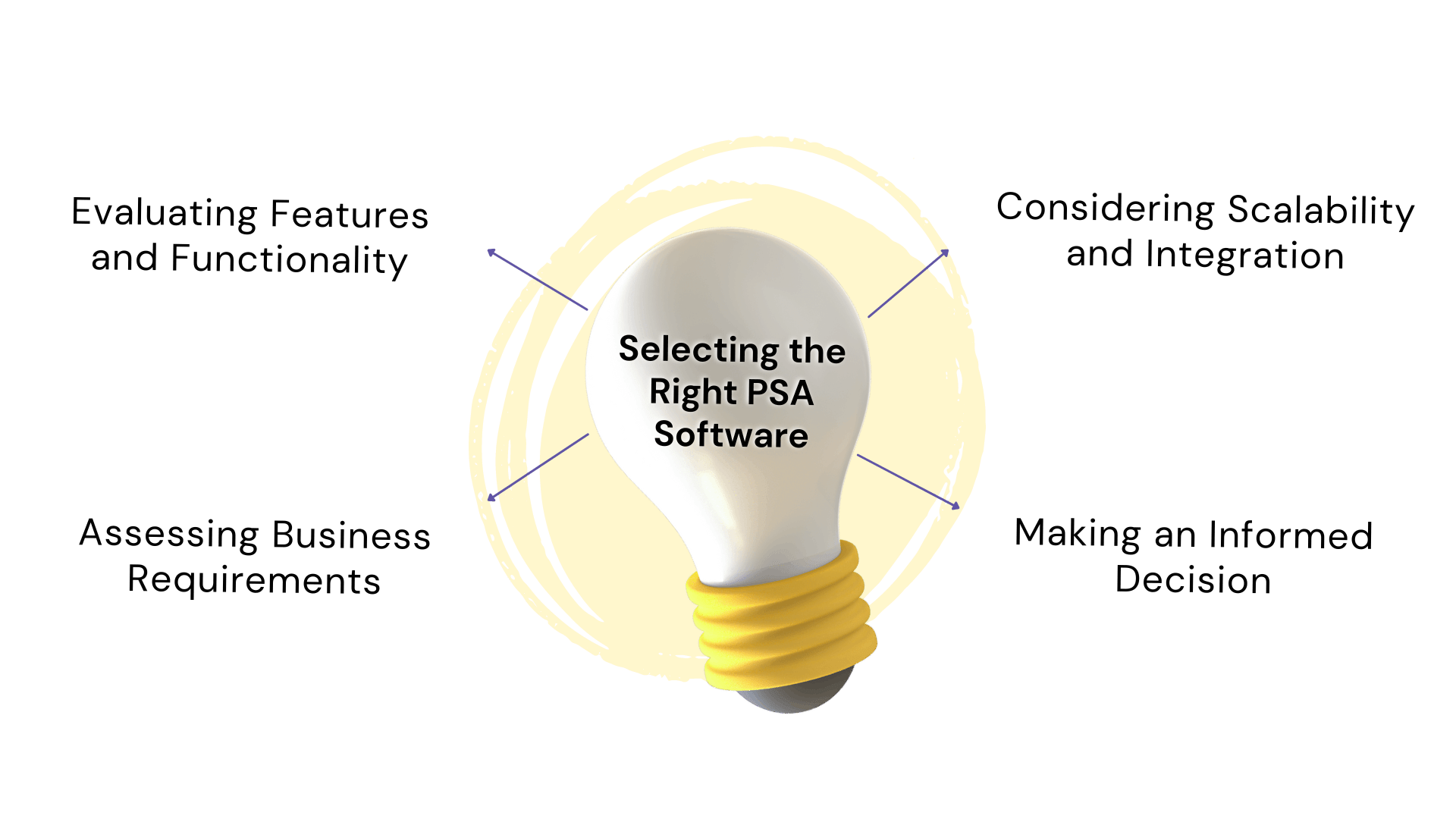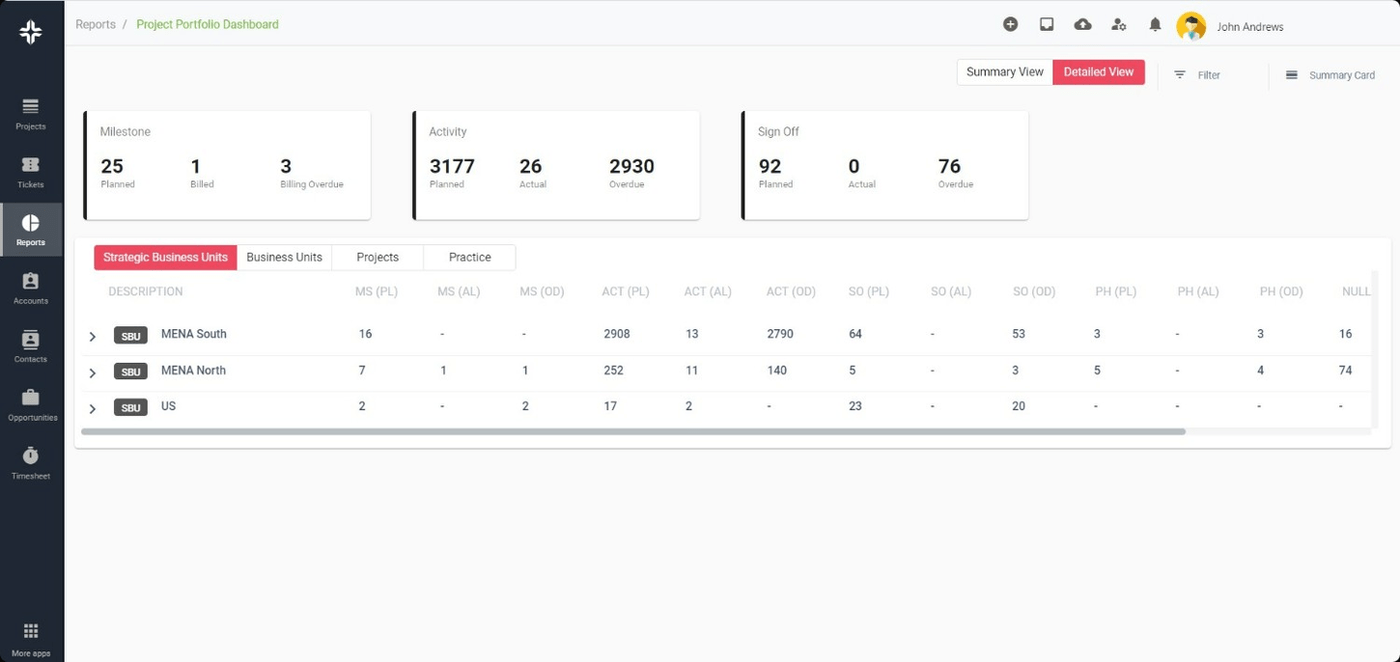
Home »
Challenges In PSA Business Operations & Solutions
Explore solutions to overcome challenges in PSA business operations.
Introduction
Effective business operations are crucial for the success of any organization, and this holds true for Professional Services Automation (PSA) as well. PSA encompasses a range of activities, including project management, resource allocation, time tracking, collaboration, and more, all of which are essential for the smooth functioning of service-based businesses. However, like any operational process, there are common challenges that businesses face within their PSA operations.
In this article, we will explore the common challenges encountered in business operations within PSA and discuss how PSA software can help overcome these challenges.
Overview of Business Operations within PSA

Business Operations within a Professional Services Automation (PSA) framework involve the management and execution of various activities related to delivering professional services to clients. PSA encompasses multiple aspects of a service-based business, including resource management, project management, time tracking, collaboration, and financial management. Let’s explore these areas in more detail:
Resource management is a critical component of PSA. It involves effectively allocating and utilizing resources such as employees, contractors, and equipment to ensure optimal productivity and profitability.
Project management within PSA involves planning, executing, and monitoring projects from start to finish. It includes defining project scope, creating timelines and milestones, assigning tasks, and tracking progress. Accurate time tracking is crucial for PSA operations. It involves recording the time spent on different tasks and activities, both billable and non-billable. Time tracking provides insights into resource productivity, project costs, and profitability.
Importance of PSA Software
| Streamlined Operations | PSA software automates and centralizes operational processes, eliminating manual workflows and fragmentation. |
| Efficient Resource Allocation | PSA software provides real-time visibility into resource availability, skills, and workload for effective resource allocation. |
| Improved Project Management | PSA software offers tools for project planning, task management, and collaboration, enhancing project management practices. |
| Accurate Time Tracking | PSA software centralizes time tracking, ensuring accuracy in measuring project progress and calculating billable hours. |
| Real-Time Visibility | PSA software provides real-time dashboards, reports, and analytics for monitoring project status, resource utilization, and financial metrics. |
| Integrated Financial Management | PSA software integrates with accounting systems, facilitating accurate financial management, expense tracking, and invoicing. |
| Scalability and Growth | PSA software accommodates business growth by offering scalability for handling increased project volumes and demands. |
PSA software plays a crucial role in the success of service-based businesses by addressing specific operational challenges and providing numerous benefits. Here are some key reasons highlighting the importance of PSA software:
- Streamlined Operations: PSA software streamlines and automates various operational processes, such as project management, resource allocation, time tracking, and invoicing. It provides a centralized platform that integrates these functions, eliminating manual and fragmented workflows.
- Efficient Resource Allocation: PSA software enables businesses to optimize resource allocation by providing real-time visibility into resource availability, skills, and workload. It helps allocate resources effectively, ensuring the right people are assigned to the right projects at the right time.
- Improved Project Management: PSA software enhances project management practices by providing comprehensive tools for project planning, task management, milestone tracking, and collaboration. It enables project managers to have better control over project timelines, budgets, and deliverables.
- Accurate Time Tracking: Time tracking accuracy is critical for measuring project progress, calculating billable hours, and determining project profitability. PSA software provides a centralized system for employees to log their time spent on various tasks and projects.
- Real-Time Visibility: PSA software offers real-time visibility into project status, resource utilization, financials, and other key metrics. It provides dashboards, reports, and analytics that enable businesses to monitor and track their operations closely.
- Integrated Financial Management: PSA software integrates with accounting systems, enabling seamless financial management, expense tracking, and invoicing. This integration ensures accurate project costing, enables efficient billing processes, and simplifies financial reporting.
- Scalability and Growth: PSA software is designed to accommodate the evolving needs of growing businesses. It provides scalability to handle increasing project volumes, resource demands, and client requirements.
Common Challenges in Business Operations within PSA
| Inefficient Resource Allocation | Businesses struggle with assigning appropriate resources to projects, resulting in underutilization or overbooking, missed deadlines, decreased productivity, and increased costs. |
| Poor Project Management | Challenges in project planning, task management, resource allocation, and progress monitoring lead to missed deadlines, cost overruns, scope creep, and dissatisfied clients. |
| Inaccurate Time Tracking | Ensuring consistent and accurate employee time tracking is a challenge, resulting in incorrect invoicing, compromised project costing, and difficulties in evaluating project profitability. |
| Inadequate Collaboration and Communication | Lack of effective collaboration tools and practices hinders information exchange, document sharing, and teamwork, leading to miscommunication, delays, errors, and decreased productivity. |
| Lack of Real-Time Visibility | Limited real-time visibility into project status, resource utilization, and financials impedes informed decision-making, bottleneck identification, and timely corrective actions. |
Inefficient Resource Allocation
One of the key challenges in PSA operations is inefficient resource allocation. Businesses often struggle with assigning the right resources to projects, leading to underutilization or overbooking of resources. This can result in missed deadlines, decreased productivity, and increased costs. Inefficient resource allocation also affects profitability and customer satisfaction.
Poor Project Management
Effective project management is essential for successful PSA operations. However, businesses may face challenges in areas such as project planning, task management, resource allocation, and monitoring project progress. Poor project management can lead to missed deadlines, cost overruns, scope creep, and dissatisfied clients.
Inaccurate Time Tracking
Accurate time tracking is crucial for measuring project progress, calculating billable hours, and evaluating project profitability. However, businesses often face challenges in ensuring employees consistently and accurately track their time. Inaccurate time tracking can result in incorrect invoicing, compromised project costing, and difficulties in analyzing project profitability.
Inadequate Collaboration and Communication
Effective collaboration and communication are vital for seamless PSA operations. However, businesses may struggle with inadequate collaboration tools and practices, hindering efficient information exchange, document sharing, and teamwork. Poor collaboration and communication can lead to miscommunication, delays, errors, and decreased productivity.
Lack of Real-Time Visibility
Limited real-time visibility into project status, resource utilization, and financials is a significant challenge in PSA operations. Without real-time visibility, businesses struggle to make informed decisions, identify bottlenecks, and take timely corrective actions. This lack of visibility can hinder project progress, hinder resource optimization, and impact overall operational efficiency.
Addressing these challenges requires strategic solutions and the utilization of PSA software. In the following sections, we will explore how PSA software can help overcome these challenges and improve business operations within PSA.

Selecting the Right PSA Software
Selecting the right PSA software is crucial for the success of your business operations. Here are key steps to consider when choosing PSA software:
- Assessing Business Requirements: Start by identifying your specific business needs and goals. Evaluate the key challenges you currently face in your PSA operations and determine the features and functionalities you require in a PSA software solution. Consider factors such as resource allocation, project management, time tracking, collaboration, reporting, and integration with existing systems.
- Evaluating Features and Functionality: Look for PSA software that offers robust features and functionalities aligned with your business requirements. Consider features like resource management, project planning and tracking, time tracking, collaboration tools, reporting and analytics, and financial management capabilities. Ensure that the software provides the necessary flexibility and scalability to accommodate your business growth.
- Considering Scalability and Integration: Choose a PSA software that can scale with your business. Consider factors like the number of users, projects, and clients the software can handle. Additionally, assess how well the software integrates with your existing systems such as CRM, accounting, and project management tools. Integration capabilities are crucial for seamless data exchange and avoiding duplication of work.
By following these steps, you can select a PSA software that best meets your business requirements, aligns with your goals, and addresses the specific challenges you face in your PSA operations. Choosing the right PSA software sets a strong foundation for successful implementation and ensures that your business operations are optimized for efficiency and growth.

Implementation and Adoption of PSA Software
Implementing and adopting PSA software requires careful planning and effective change management to ensure successful adoption and integration within your organization. Here are important steps to consider during the implementation and adoption process:
Define Implementation Goals: Clearly define your implementation goals and objectives. Identify what you want to achieve with the PSA software, such as improving resource allocation, enhancing project management, or streamlining invoicing processes.
Plan the Implementation Process: Develop a detailed implementation plan that outlines key milestones, tasks, and timelines. Assign responsibilities to team members involved in the implementation process and establish communication channels to ensure smooth coordination.
Provide User Training and Support: Invest in comprehensive user training to ensure that all stakeholders understand how to effectively use the PSA software. Conduct training sessions, provide user manuals or online resources, and encourage hands-on practice.
Implement Change Management Strategies: Implementing a new software system often involves changes in processes and workflows. Develop change management strategies to facilitate a smooth transition.
Data Migration and Integration: If you are transitioning from existing systems, plan and execute the migration of data to the PSA software. Ensure data integrity and accuracy during the transfer. Integrate the PSA software with other relevant systems, such as CRM or accounting software, to streamline data exchange and avoid duplication of efforts.
Promote User Engagement and Adoption: Encourage user engagement and adoption of the PSA software by highlighting its benefits and success stories. Celebrate small wins and recognize employees who effectively use the software.
By following these implementation and adoption strategies, you can effectively integrate the PSA software into your business operations. Successful implementation and adoption will result in improved efficiency, streamlined processes, enhanced collaboration, and increased overall productivity within your organization.

Overcome business operations Challenges with KEBS

KEBS - People Allocation
KEBS offers a comprehensive suite of products and features that can help businesses overcome common challenges in their operations. Let’s explore how KEBS addresses these challenges:
- Resource Allocation: KEBS Resource Management enables businesses to efficiently allocate and utilize their resources. With features like employee data management, leave tracking, and automated employee exit processes, KEBS helps optimize resource utilization. The Employee 360 feature provides a comprehensive database of all resources, allowing businesses to have a clear overview of their workforce and make informed decisions regarding resource allocation.
- Project Management: KEBS Project Management capabilities provide businesses with the tools they need to effectively plan, track, and deliver projects. The Gantt Chart feature allows for visual tracking of project progress, enabling businesses to manage tasks, set milestones, and monitor resource allocation. With KEBS, businesses can streamline project workflows, ensure effective task management, and ultimately deliver projects on time and within budget.
- Time Tracking: KEBS Time Tracking feature simplifies and automates the process of tracking time. By replacing excessive paperwork with an automated leave tracker and approver, KEBS reduces the chances of inaccurate time tracking. This feature provides businesses with accurate data for project costing, invoicing, and financial reporting, leading to improved accuracy and efficiency.
- Collaboration and Communication: KEBS Collaboration tools facilitate seamless communication and collaboration among team members. The platform offers features such as centralized ticket management, task assignments, and document version control. These tools ensure efficient communication, enhance collaboration, and improve teamwork, leading to increased productivity and smoother project execution.
- Real-Time Visibility: KEBS provides businesses with real-time visibility into their operations through customizable dashboards, reports, and analytics. With financial insights in every facet of operations, businesses can gain a comprehensive view of their financial performance. This visibility allows for informed decision-making, proactive financial management, and the ability to identify and address potential issues promptly.
By leveraging the products and features of KEBS, businesses can overcome challenges related to resource allocation, project management, time tracking, collaboration, and real-time visibility. KEBS provides the necessary tools and functionalities to streamline operations, enhance productivity, and achieve success in professional services.

Conclusion
In the dynamic and fast-paced world of professional services, businesses often face common challenges in their operations. However, with the right solution in place, such as KEBS PSA software, these challenges can be effectively overcome.
Implementing KEBS PSA software empowers businesses to optimize their quote-to-cash processes, enhance HR management, deliver successful projects, proactively manage finances, and provide efficient ticket handling. By leveraging the features and benefits of KEBS PSA software, businesses can position themselves for growth, profitability, and a competitive edge in the technology services industry.
Streamline your Quote to Cash with KEBS !
Streamline your Quote to Cash with KEBS !









